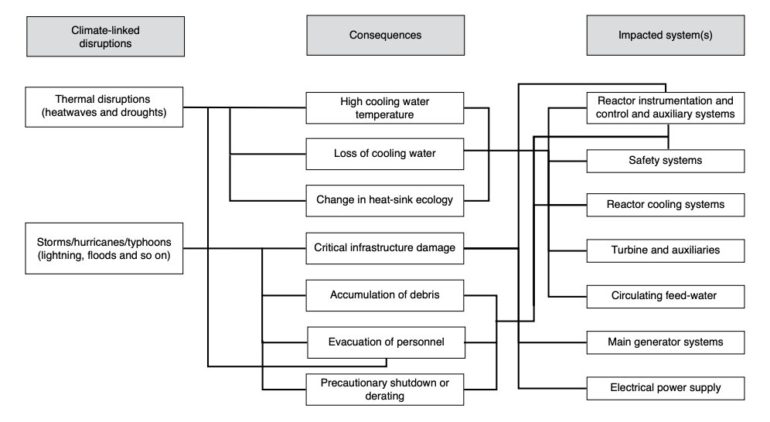Past research suggests that climate change and energy systems have a bidirectional relationship. In other words, just like emissions from energy systems can fuel climate change, climate change could also expose the vulnerabilities or shortcomings of energy systems.
For instance, climate change could adversely impact the operation of critical energy systems and infrastructure, potentially disrupting the provision of electricity. While nuclear power plants (NPPs) could be a viable solution for generating low-carbon electricity, the operation of these plants is susceptible to climate change and to the extreme weather conditions resulting from it.
Ali Ahmad, a researcher at Harvard University, recently carried out a study investigating the possible effects of climate change on NPPs. His paper, published in Nature Energy, specifically assessed whether climatic changes over the past three decades impacted the frequency of nuclear power outages.
“With more than three decades of data on changing climate, we are now in a position to empirically assess the impact of climate change on power plant operations,” Ahmad wrote in his paper. “Such empirical assessments can provide an additional measure of the resilience of power plants going forward. Here I analyze climate-linked outages in nuclear power plants over the past three decades.”
Compared to other power plants, such as those based on fossil fuels and biomass, NPPs require stricter safety regulations. Moreover, after an unplanned outage, nuclear reactors need to undergo a series of tests and analyses aimed at identifying the issue, thus it can take a while before they are started again.
Understanding the extent to which climate change can impact the functioning of NPPs is thus of vital importance, as it could inspire the development of strategies to mitigate these climate-related effects. In his paper, Ahmad examined the frequency of climate-linked nuclear power outages over the past three decades or so.
Overall, he found that NPP outages caused by climatic events have become increasingly more frequent in the past few decades. Many of these outages were induced by changes in climate, while others were a result of natural disasters such as earthquakes or tsunamis. Ahmad screened available data to only focus on outages associated with climate change.
“My assessment shows that the average frequency of climate-induced disruptions has dramatically increased from 0.2 outage per reactor-year in the 1990s to 1.5 in the past decades,” Ahmad wrote in his paper. “Based on the projections for adopted climate scenarios, the average annual energy loss of the global nuclear fleet is estimated to range between 0.8% and 1.4% in the mid-term (2046-2065) and 1.4% and 2.4% in the long term (2081-2100).”
As many researchers have been highlighting the value of nuclear power as a means to slow down and mitigate climate change, understanding the effects of climatic changes and global warming on NPPs before humans start heavily relying on them is of great importance. Ahmad’s recent analyses demonstrate that the operation of NPPs was significantly disrupted by changes in climate over the past decades. In the future, the results of his study could help to create more realistic economic and nuclear energy models that take climate-associated risks into consideration.
Why nuclear energy isn’t a safe bet in a warming world
More information:
Increase in frequency of nuclear power outages due to changing climate. Nature Energy(2021). DOI: 10.1038/s41560-021-00849-y
2021 Science X Network
Citation:
Study reveals an increase in the frequency of nuclear power outages caused by climate change (2021, August 6)
retrieved 6 August 2021
from https://techxplore.com/news/2021-08-reveals-frequency-nuclear-power-outages.html
This document is subject to copyright. Apart from any fair dealing for the purpose of private study or research, no
part may be reproduced without the written permission. The content is provided for information purposes only.



